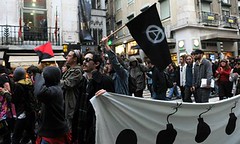
Workers have taken to the streets in Portugal against austerity measures being imposed by the government and the European Union to address the capitalist economic crisis. The crisis is acute in Greece, Spain, Ireland and Britain.
Originally uploaded by Pan-African News Wire File Photos
By Marco T' Hoen
Epoch Times Staff
Last Updated: Nov 24, 2010
Public services and transportation came to a grinding halt in Portugal Wednesday as the country experienced its biggest strike in 22 years. Two major trade unions called a 24-hour strike to protest government austerity measures.
The strike grounded most flights, closed ports, and stopped subway trains, bus and ferry connections, according to Portuguese daily news Diario Noticias.
France 24 reported that hospitals, schools, and other public services were also affected.
The General Confederation of the Portuguese Workers (CGTP) and General Worker's Union (UGT) that called for the strike, reported 3 million participants, mostly from the public sector.
Portuguese Minister of Labor Helen Andrew, rejected this number saying that the country continued to function through the strikes, whereas if 3 million out of 4.9 million registered workers in Portugal had indeed participated, the country would have stopped, according to Portuguese online newspaper, diariodigital.
The government will vote Nov. 26 on next year's spending plan with austerity measures including a 5 percent cut from some public sector salaries, a hiring freeze, and raise the value added tax from 21 to 23 percent, according to Bloomberg.
Unions bring Portugal to a grinding halt as Irish-style bailout looms
General strike shuts down public transport in cuts protest
Giles Tremlett in Lisbon guardian.co.uk,
Wednesday 24 November 2010 19.12 GMT
Trades unions brought parts of Portugal to a grinding halt as a general strike shut down most public transport in protest at cuts being introduced to stave off an Irish-style debt crisis.
Most flights in and out of Portugal were cancelled, ferries across the River Tagus remained at their berths, metro stations were closed and only a handful of trams ran as Lisbonites sought other ways to get to work. Angry British tourists were among those left stranded at airports.
"It is like a Sunday here," said newspaper salesman Francisco Amaral outside Lisbon's Cais do Sodré transport interchange, where the metro and ferry stations were closed and only a handful of overland trains ran.
Trade unions claimed 80% of workers stayed at home, while the government put the figure at around 20%. "This may not change the budget plans, but they know now how the workers feel about taking the biggest part of the cuts," said local Lisbon union organiser Libério Domingues.
Portugal's parliament is expected to approve a budget on Friday that will include pay cuts for civil servants as the government tries to reduce next year's deficit to 4.6%. It was by no means clear, however, that the budget would prevent Portugal following Ireland and Greece by seeking bailout money to help pay debts. Yields on Portugal's 10-year bonds rose above 7% – a level that many analysts consider unsustainable.
"In some ways this is now a problem that is beyond Portugal's control. It is not a problem that can be solved with one year's budget," said one economist. "And if risk aversion in the market increases, there is not much you can do about it."
The chances of Portugal eventually asking for help are now "above 50%", argued Phyllis Reed, of Kleinwort Benson.
Portuguese Strike as Contagion Spreads to Streets: Euro Credit
Submitted by Jitendra Tiwari on Wed, 11/24/2010 - 15:42
Jose Socrates, Portuguese Prime Minister is confronting the nation's largest walkout in 22 years as workers and the government come to blows through Europe's money owing disaster extend through bond souks to the streets.
Personnel are moving off the office today to complain government severity events as anxiety regarding Socrates's aptitude to domesticate the euro- district fourth- major financial plan shortfall hard-pressed the expenditure of covering Portugal's debt in opposition to non-payment to a record far above the ground.
Credit default swaps mounted up by 23 basis points yesterday to 482.2, at the same time as the earnings premium insisted to hold the nation's 10-year bonds on top of German bunds hoisted by 15 basis points today to 450.
The backlash in opposition to wage slash and tax augment to cut down the euro-region shortfall is igniting political chaos and depression of investor poise. Brian Cowen, the Irish Prime Minister expressed on Nov. 22 that he will look for in the early hour's elections subsequent to an important friend deserted his decision alliance on top of his verdict to look for an EU bailout.
Silvio Berlusconi, Italian Prime Minister confronts a December poise ballot and George Papandreou; Greek Prime Minister in addition endangered this month to grasp elections.
No comments:
Post a Comment